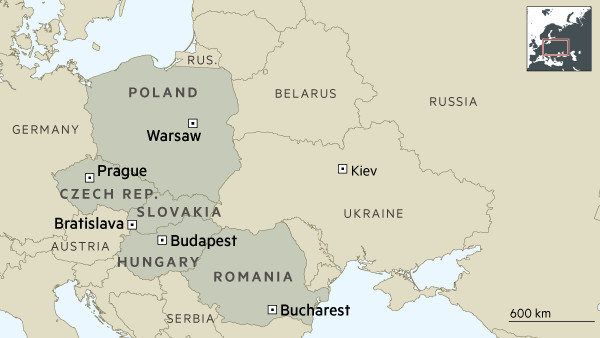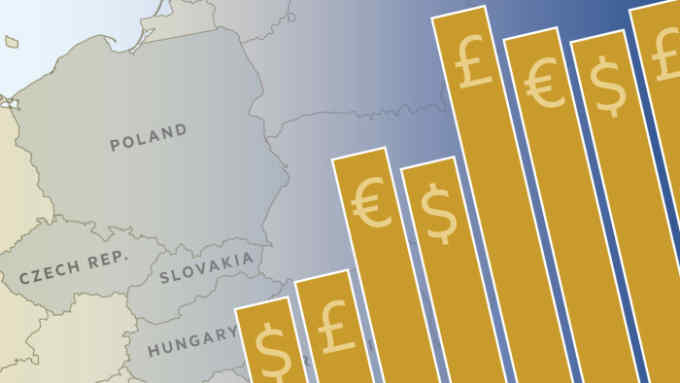EU uneasy over China’s efforts to woo central and eastern European states

Simply sign up to the EU economy myFT Digest -- delivered directly to your inbox.
For the past half decade China has been eyeing central and eastern European countries in the search of new export markets and political influence. But Beijing’s interest in the region has now visibly increased.
Last year Xi Jinping, China’s president, travelled to the region, first to the Czech Republic then to Poland and Serbia, without visiting their western European neighbours.
Soon afterwards, Li Keqiang, the Chinese premier, was the star turn at an investment forum in Riga, Latvia’s capital, in November. At a meeting with 16 prime ministers from central and eastern European nations, Mr Li announced a new fund that promised to inject $11bn of fresh capital into the region, the latest indication of China’s strategic interest.
China’s push has gathered steam with the creation of a “16+1” group, convened by Beijing five years ago. This provides a platform for the Asian giant to deepen ties with central and eastern European countries and link Asia, Africa and Europe through its wider “Silk Road” initiative.
“For China, the region represents a gateway to larger European markets,” says Cui Hongjian, director of European studies at the China Institute of International Studies. Beijing believes that investing in the region will ease market access for its companies to Europe, while providing cash-strapped regional economies with much-needed infrastructure funding.

But few of the promises of Chinese capital made in recent times have come to fruition. While smaller investments in infrastructure and energy have showed promise, large projects — like a planned $2.9bn high-speed railway between Belgrade and Budapest — have been slow to materialise.
Despite all the fanfare, five years of China’s visible presence in the region have amounted to little. Some worry that the latest promises will be no different. “China announced the new [$11bn] fund to reassure central and eastern countries that money is coming,” says Angela Stanzel, a fellow at the European Council for Foreign Relations. “But an initial response from these countries has been rather sceptical”.
China’s direct investment into EU countries in the region has accounted for only about 8 per cent of all such funding in Europe in recent years, according to Rhodium Group, a research firm. Vastly more goes to western European countries, such as Germany, France and the UK.
But, while Chinese efforts have had only modest results across the region, some countries have seen new capital as a welcome source of funding and reaped most of its benefits. Hungary and Poland have received 40 and 20 per cent, respectively, of all China’s investment in the region in recent years. And Serbia has raised two-thirds of all Chinese capital to non-EU countries in the region.
“The way China is received politically in these countries has played a huge role in their attractiveness to Chinese investors”, explains Ms Stanzel. “Hungary, in particular, has been very welcoming to Chinese investment with no strings attached, as long as it fits EU rules.”
The increasingly central role that politics appears to play in helping the Chinese enter markets in the region has been on display in the Czech Republic. Milos Zeman, the country’s president, known for his hostility towards the EU, has nourished links with Beijing, not least with his appointment of Ye Jianming, chairman of CEFC China Energy, the Chinese conglomerate, as his adviser on economic policies.
The warming of relations between Prague and Beijing has culminated not only in Mr Xi’s visit to Prague last year, but also a flurry of 30 new deals potentially worth $9.8bn. Among these is a $1bn deal by CEFC to take a 50 per cent stake in a Czech-Slovak bank, J&T Financial Group.
But as China increasingly deepens economic ties with the countries where populist politicians thrive, critics worry that the Chinese presence is not just about trade and investment but about Beijing wanting to wrest influence away from the EU.
“The optimism of eastern European countries [about Chinese investment] stands in contrast with the growing protectionist backlash in western Europe,” says Ms Stanzel. Western European nations have been increasingly critical of China’s investment push particularly into sensitive high-tech projects.
As eastern European politicians diverge from their western counterparts and appeal to Beijing in the hope of securing new deals, this raises concerns not only about the EU’s ability to speak with one voice on investment rules towards China, but also on the bloc’s foreign policy towards the Communist-ruled Asian powerhouse.
This became evident last year when the EU was unable to adopt a declaration noting China’s legal defeat over expansive Chinese territorial claims in the South China Sea. Hungary and Greece were unwilling to criticise China, not least because of investment promises from Beijing.
The growing east-west divide in Europe on China will be on display next week in Beijing. Mr Xi will gather “a circle of friends”, as described by Chinese foreign minister Wang Yi, for a summit on China’s “new Silk Road”. Most European leaders have decided to miss the summit, with the notable exception of the Hungarian, Serb and Polish prime ministers and Czech president, who are scheduled to attend.


Comments